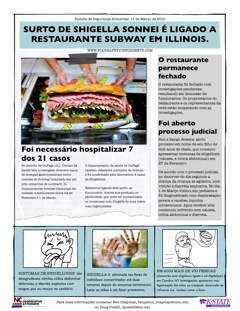Erin Stadler was at her baby shower in North Carolina in 1997 when she at a piece of brie cheese that was contaminated with listeria. The disease made Stadler and her unborn child deathly ill.
.jpg) "You don’t think about eating one piece of cheese and almost dying. That’s basically, what happened for both of us," said Stadler.
"You don’t think about eating one piece of cheese and almost dying. That’s basically, what happened for both of us," said Stadler.
When Stadler went to the hospital, doctors immediately delivered baby Allison. She was premature at 33 weeks. Allison was in the hospital for two more weeks for additional tests when doctors realized how ill both Erin and Allison were.
Two pregnant women on Virgin Blue Australian flights last year gave birth prematurely after being served listeria-laden chicken wraps.
In the fall of 2008, along with the Maple Leaf listeria-in-deli-meat mess, an outbreak of listeria in cheese in Quebec led to 38 hospitalizations, of which 13 were pregnant and gave birth prematurely. Two adults died and there were 13 perinatal deaths.
A Sept. 2008 report showed that of the 78 residents of the Canadian province of British Columbia who contracted listeriosis in the past six years, 10 per cent were pregnant women whose infections put them at high risk of miscarriage or stillbirth.
The majority — nearly 60 per cent — of pregnant women diagnosed with listeriosis either miscarry or have stillbirths.
The authors wrote,
"Health care providers [want] better information for themselves and resources they could share with pregnant women. … The information provided to pregnant women by health care providers needs to be targeted and clear," and that as a result of the spring survey, BCCDC will start a project to better inform health care providers and their patients about food safety risks during pregnancy.
(2).jpg) The U.S. Centers for Disease Control and Prevention (CDC) has estimated approximately 2,500 cases of liisteriosis occur annually in the United States, with about 500 cases resulting in death. In 2000, listeria exposure resulted in a higher rate of hospitalization than any other foodborne pathogen and more than one-third of reported deaths from food pathogens.
The U.S. Centers for Disease Control and Prevention (CDC) has estimated approximately 2,500 cases of liisteriosis occur annually in the United States, with about 500 cases resulting in death. In 2000, listeria exposure resulted in a higher rate of hospitalization than any other foodborne pathogen and more than one-third of reported deaths from food pathogens.
CDC has a list of foods to avoid while pregnant: deli meats or cold-cuts top the list. Health Canada has similar advice.
Which makes a report in the April 2010 edition of the journal, Canadian Family Physician, absolutely baffling.
Worse, the report was authored by the Motherisk team at the previously reputable Toronto Hospital for Sick Children.
The authors state, correctly, that the incidence of listeria “among pregnant women remains about 20 times higher compared with the general population,” but go on to state, without any references, that “pregnant women need not avoid soft-ripened cheeses or deli meats, so long as they are consumed in moderation and obtained from reputable stores.”
Here is the actual Q&A as printed in the article:
QUESTION After hearing about outbreaks of illness resulting from Listeria and Salmonella, many of my patients are wondering about the risks of food-borne illnesses during pregnancy and what they can do to reduce their chances of contracting them.
ANSWER Although heating or cooking food is the best way to inactivate food-borne pathogens, improved standards and surveillance have reduced the prevalence of contaminated foods at grocery stores. Therefore, it is no longer necessary for pregnant women to avoid foods like deli meats and soft cheeses (associated with Listeria); soft-cooked eggs (associated with Salmonella); or sushi and sashimi. Regardless of whether seafood is raw or cooked, pregnant women should choose low .jpeg) mercury seafood (eg, salmon and shrimp) over higher mercury varieties (eg, fresh tuna). Pregnant women should ensure that their food is obtained from reputable establishments; stored, handled, and cooked properly; and consumed within a couple of days of purchasing.
mercury seafood (eg, salmon and shrimp) over higher mercury varieties (eg, fresh tuna). Pregnant women should ensure that their food is obtained from reputable establishments; stored, handled, and cooked properly; and consumed within a couple of days of purchasing.
I have no idea what the authors mean by a reputable source. I have no idea how this advice got approved and published. How is it that the authors, Carolyn Tam, a graduate student in clinical pharmacology at the University of Toronto, Aida Erebara MD, and Adrienne Einarson RN, assistant director of the Motherisk Program could come up with such terrible food safety advice from the 25-year-old Motherisk program which is designed “to ensure the well-being of mothers and babies, worldwide.”
And they want donations.
Someone has already sent the editor a letter of protest.
Thanks to the barfblog.com reader who sent me the link.

 government has decided to remind Canadians of the importance of food safety for older adults.
government has decided to remind Canadians of the importance of food safety for older adults.
.jpg) Canada. He was front and center last time. How about the Canadian Food Inspection Agency? What about the Public Health Agency of Canada or Health Canada?
Canada. He was front and center last time. How about the Canadian Food Inspection Agency? What about the Public Health Agency of Canada or Health Canada? Its part of a dramatic spike in listeria cases in Ontario since January that has renewed concerns about the country’s food safety system 18 months after 22 Canadians died in the Maple Leaf tragedy (fiasco – dp).
Its part of a dramatic spike in listeria cases in Ontario since January that has renewed concerns about the country’s food safety system 18 months after 22 Canadians died in the Maple Leaf tragedy (fiasco – dp).